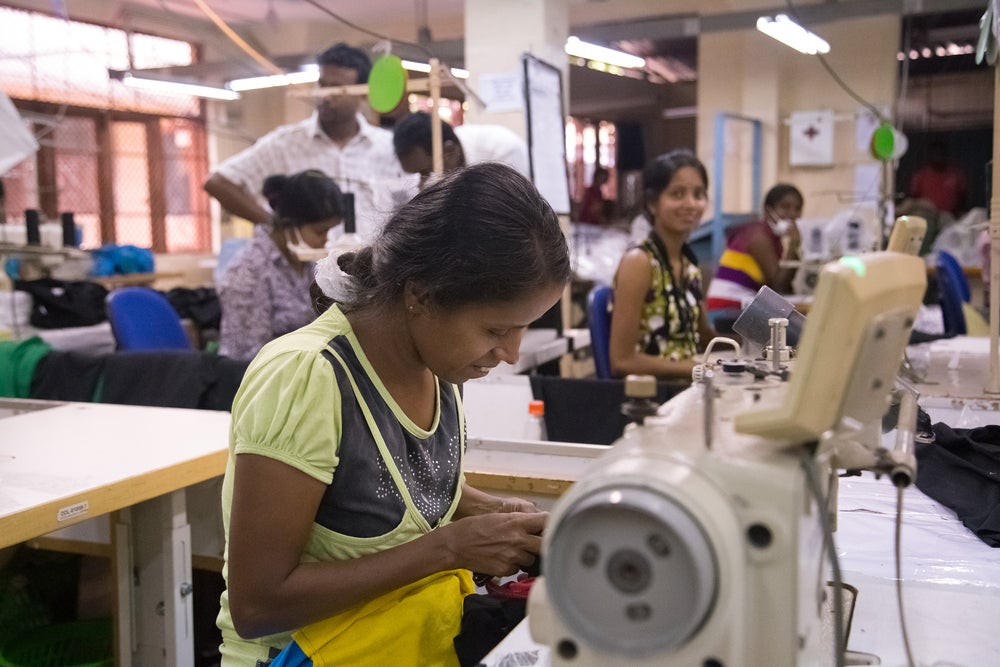
The Global Organic Textile Standard (GOTS), a global processing standard for textiles manufactured using organic fibres, has revealed a substantial uptick in certified facilities within Sri Lanka, underlining a growing awareness of international best practices and sustainable manufacturing principles among Sri Lankan apparel companies.
Sri Lanka’s apparel industry body the Joint Apparel Association (JAAF) has taken note of this positive trend and a South Asian representative of GOTS Ganesh Kasekar revealed a 21% increase in certified facilities compared to the previous year. Presently, 74 factories in Sri Lanka have secured GOTS certification for the period of 2023/2024.
Local apparel giants such as Hirdaramani International Exports, MAS Intimates, and Brandix are among those who have obtained GOTS certification, enabling them to produce sustainable clothing for children, women, men, and infants.
GOTS defines high-level environmental criteria throughout the organic textile supply chain, as well as compliance with social criteria. Obtaining a GOTS certification lets companies participate in the GOTS programme, granting them the privilege to use the GOTS logo on approved goods. The certification is subject to annual renewal, with the introduction of GOTS 7.0 in March 2023, mandating full compliance for all certified entities by March 2024.
“Simply claiming to be sustainable is not enough,” said Kasekar. “GOTS has developed standards that cover the entire production process, based on the use of organic fibres, from textile processing and manufacturing up to licensing and labelling. The certification process is rigorous and requires compliance with all criteria, but ultimately leads to an internationally recognised organic certification.”
Worker welfare is central to all GOTS-certified Sri Lankan companies, who say they are committed to preventing and eradicating any form of human rights violations within their supply chains.

US Tariffs are shifting - will you react or anticipate?
Don’t let policy changes catch you off guard. Stay proactive with real-time data and expert analysis.
By GlobalDataThese organisations are said to have robust policies against forced and child labour and implement measures to combat discrimination, harassment, and violence.
Kasekar highlighted that the textile industry holds promise in addressing economic challenges in Sri Lanka, and it is imperative for local industries to align with sustainability standards encompassing environmental, social, and governance criteria.
He went on to say that compliance certifications like GOTS play a pivotal role in seamlessly integrating with global supply chains and international trade by adhering to globally accepted trading standards. This is especially crucial as Sri Lanka seeks to expand its exports, attract investors, and bolster foreign exchange inflow.
GOTS said it prioritises female workers’ rights, collective bargaining, occupational health and safety, fair compensation, and evaluating living wage disparities, aligning with international labour and human rights standards.
The textile standard organisation also places importance on social responsibility, environmental sustainability, and ethical business practices in its textile production, ensuring sustainable principles from the use of organic fibres to manufacturing and labelling.
A key requirement for earning a GOTS certification is that textile products must contain a minimum of 70% organic fibres, demonstrating a genuine commitment to environmentally friendly materials. Further, the use of chemical inputs is closely regulated, and the selection of accessories is guided by ecological considerations, underscoring the significance of responsible water management through mandatory functional wastewater treatment facilities.
Kasekar added: “Sustainability is no longer just a trendy buzzword. Certified organic products offer a practical solution for retailers and consumers to make legitimate and verifiable sustainability claims for textile products. The demand for organic products is strong in the US and EU markets, driven by environmentally-conscious Gen Next consumers.”
As Sri Lanka’s apparel industry looks to the future, it acknowledges the numerous advantages offered by GOTS certification. GOTS added that its certification offers risk reduction, third-party credibility, quality assurance, investor confidence, efficiency, and regulatory compliance, enhancing wastewater management, cost reduction, and value addition.



